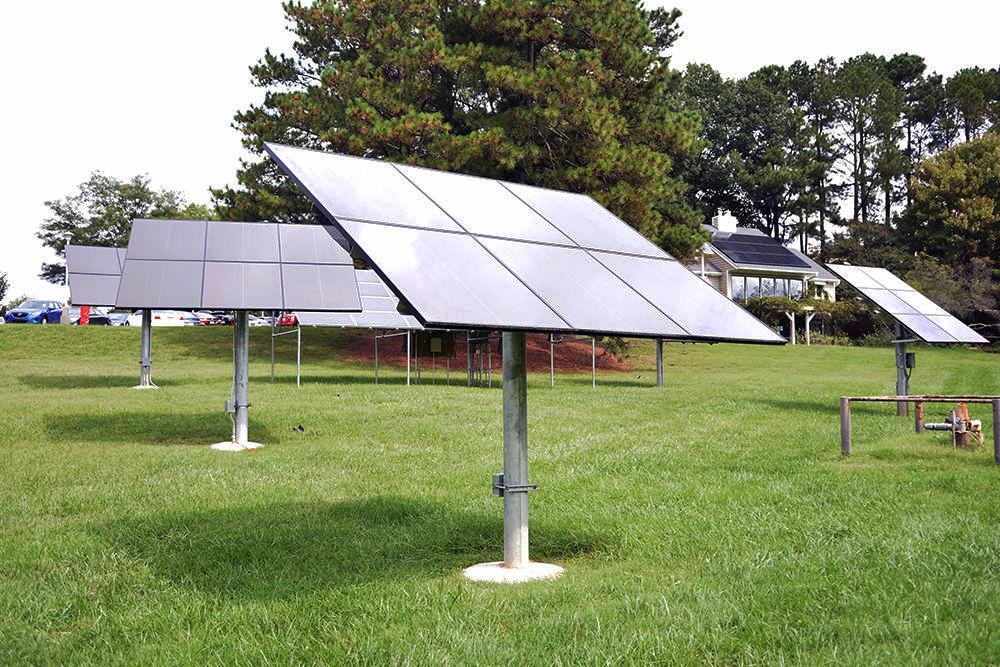
Logan LaBo/Archive
Solar panels installed by the North Carolina Clean Energy Technology Center sit outside of the Solar House at the McKimmon Center.
Over the past several years, solar power-based projects have been created around campus, showing NC State’s commitment to alternative energy and the environment.
Solar energy has increasingly become a more viable source for power on NC State’s campus through several projects that have developed recently. Tracy Dixon, the director of the University Sustainability Office, spoke about NC State’s solar projects.
“We have probably about 14 small-scale solar installations right now, and we are continually looking for additional opportunities for large-scale solar,” Dixon said.
One of the more recent solar endeavors on campus was the solar-powered charging station at the Witherspoon bus stop. This project was led by Christian Rust, a fourth year studying chemical engineering and textile engineering.
“Our idea originally was to install a solar system that would power a TransLoc screen and charging station, so students could see when the next bus was coming, see all the bus routes, where they could go, what they could do,” Rust said.
Despite systemic complications with implementing a screen, Rust was still able to successfully add the charging station to work for the needs of students.
Some of NC State’s more iconic solar projects include the Solar House near the McKimmon Center and the solar tree structures on Centennial Campus. Dixon also mentioned many projects that were started by students like Rust.
“The scoreboard project, the solar charging station at the bus stop, which was led by the [NC State Stewards],” Dixon said. “The solar umbrellas were also led by the Stewards. A lot of these solar projects came into being to prove the technology.”
Rust mentioned another notable addition to campus: solar-powered compacting trash and recycling bins. These units were originally tested around Raleigh a couple of years ago, and the items were found to have dropped the area’s cost of trash collection from over $40,000 to just $1,607.
“The university has really enjoyed those, because they can let people know when they’re full so that you don’t have to always go and empty trash cans,” Rust said. “I think they also have a larger capacity because they compact the trash.”
Dixon pointed out that NC State provides grants for students to bring their sustainability-focused ideas to life.
“Quite a few of the installations were funded at least in part by the Sustainability Fund,” Dixon said. “That is always an opportunity for students to think through an idea, work with partners, apply for funding and make their ideas come to reality.”
Rust and the NC State Stewards applied for one such grant, and got $10,000 to help complete the project.
“We applied for the grant, that was way back, my freshman year, and then got it towards the middle or end of that year and started implementing the project from there, which eventually led to the installation my sophomore year,” Rust said.
Dixon said the hope is that these small-scale projects lead the way for more, preferably larger installations. Rust is actually working on installing another solar charging station, this time on Gorman Street. He is receiving help from the McKimmon Center and the city of Raleigh, rather than a Sustainability Fund grant.
“That’s kind of a big next step in terms of sustainability projects, taking it from the university funding it to other organizations funding it, because they see a need for it and see a use for it,” Rust said. “It’s been a hard leap going from the university funding it to other outside organizations sponsoring it.”
Dixon said that solar efforts show that NC State is dedicated to sustainability.
“One of the biggest drivers is NC State has publicly said we will be climate neutral by 2050,” Dixon said. “Solar does play a role in that commitment.”
Research is also a big part of installing solar energy on campus.
“A lot of the installations that you see now have active research going on around them,” Dixon said. “And then just, proving the viability of solar energy and how that can be applied on a campus setting.”
According to Rust, most solar projects on campus are about showing and educating people about the possibilities of the available technology.
“It’s a way that we can do education and outreach and leverage the system that we have as a showcase of sustainability, so saying the university cares about sustainability,” Rust said.
The ultimate hope, according to Rust, is that interest in solar grows, and the projects expand in scale. Information about NC State’s Sustainability Fund can be found here.